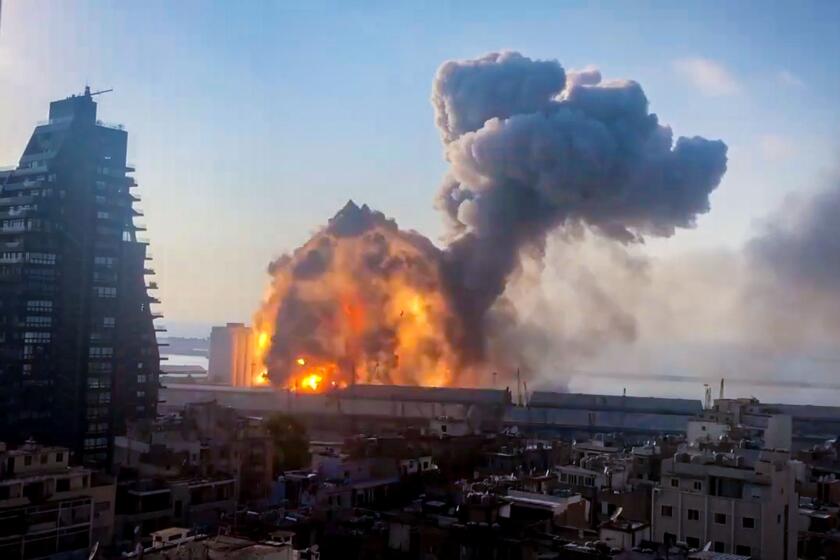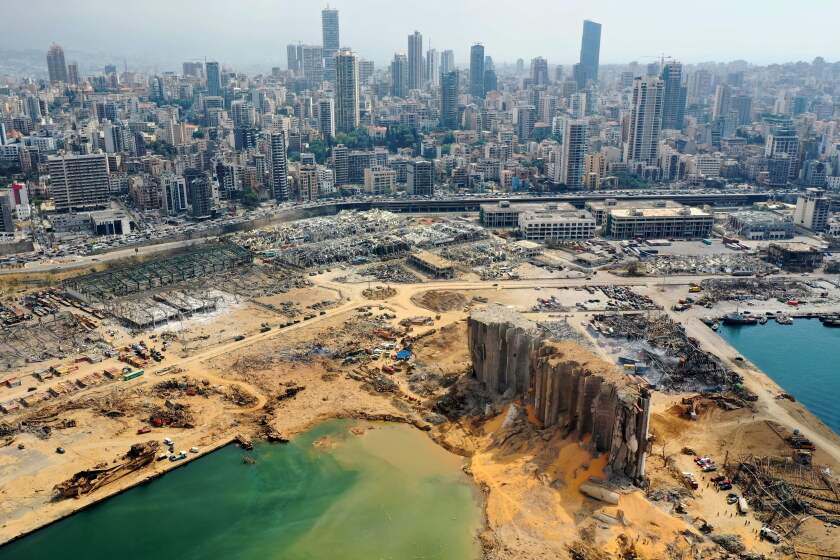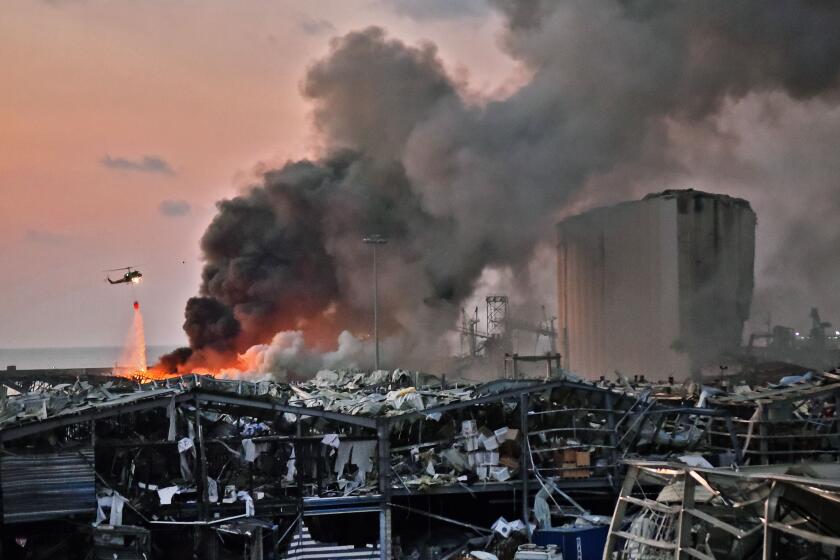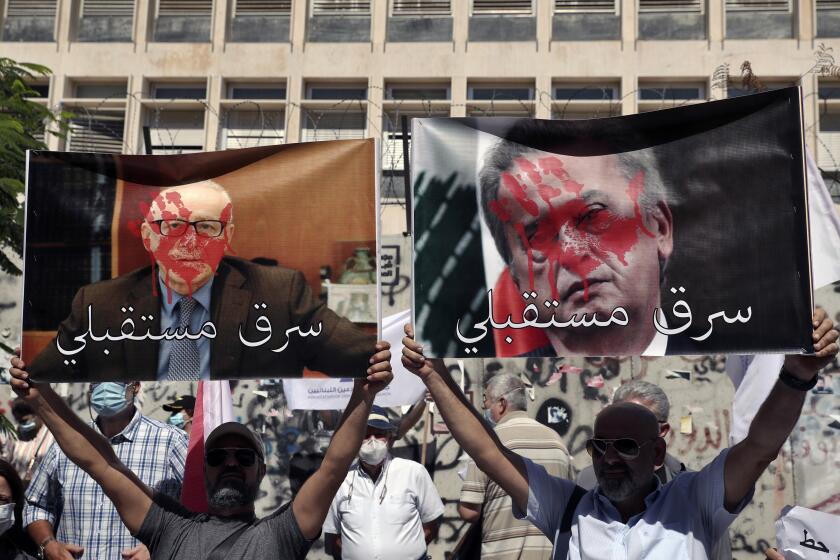6 die in gun battles during protest of Beirut blast inquiry
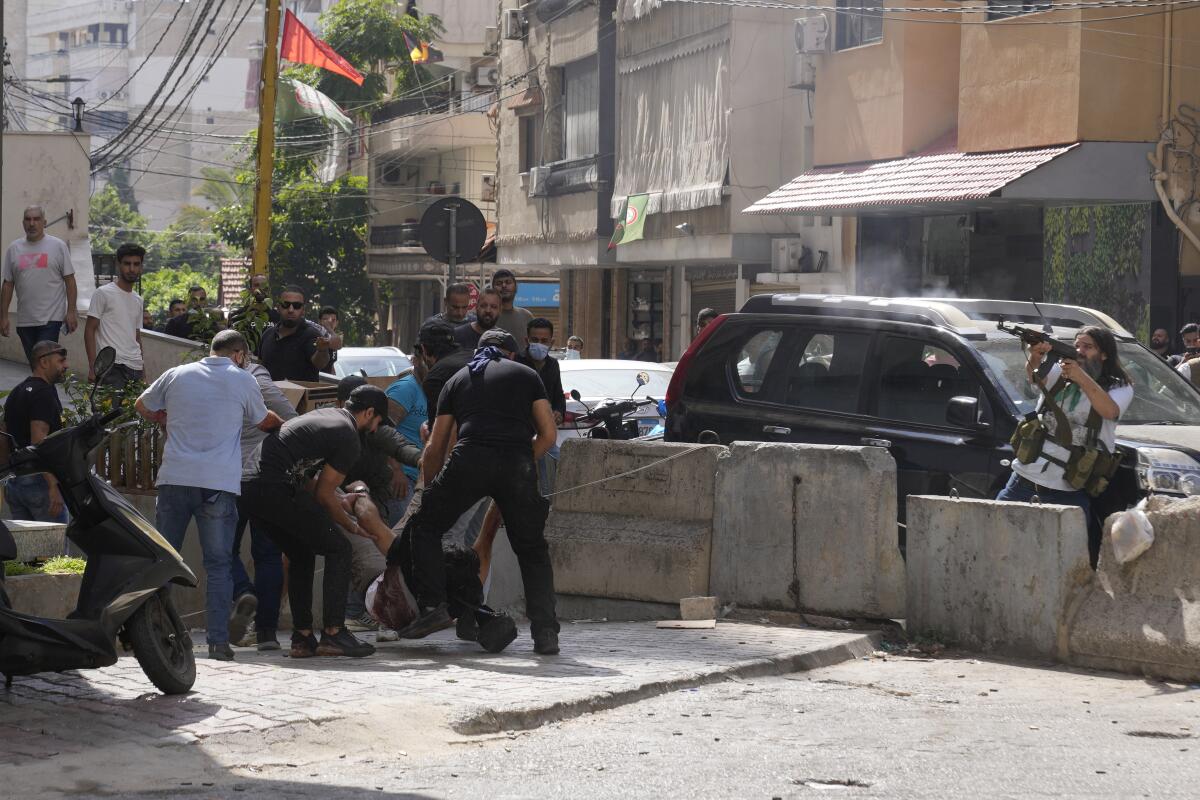
- Share via
BEIRUT — Heavy gunfire broke out Thursday in Beirut during a protest that the militant group Hezbollah organized against the judge leading the investigation into last year’s blast in the city’s port. At least six people were killed and many more wounded in the most violent street fighting in the Lebanese capital in years.
The exchanges of fire along a former front line from the 1975-90 civil war involved pistols, automatic rifles and rocket-propelled grenades and were reminiscent of that conflict. Gunfire echoed for several hours and ambulances, sirens wailing, rushed to pick up casualties. Snipers shot from buildings. Bullets penetrated apartment windows. Schools were evacuated and residents hid in shelters.
The chaos raised the specter of a return to sectarian violence in a country already embroiled in multiple crises, including one of the world’s worst economic crises of the last 150 years.
It was unclear who started the shooting, which began shortly after the start of the protest organized by the Iran-backed Hezbollah and its Shiite allies from the Amal movement against Judge Tarek Bitar, who is leading the investigation into the port explosion. Hezbollah and its allies accuse the judge of singling out politicians for questioning, most of them allied with Hezbollah.
Tensions over the port blast have contributed to Lebanon’s many troubles, including a currency collapse, hyperinflation, soaring poverty and an energy crisis leading to extended electricity blackouts.
Officials from both Shiite parties, including Hezbollah leader Hassan Nasrallah, had attacked Bitar for days, accusing him of politicizing the investigation by charging and summoning some officials and not others. They want him removed.
So far, none of Hezbollah’s officials have been charged in the 14-month investigation.
The inquiry centers on hundreds of tons of ammonium nitrate that were improperly stored at a port warehouse that detonated Aug. 4, 2020. The blast killed at least 215 people, injured thousands and destroyed parts of nearby neighborhoods. It was one of the largest nonnuclear explosions in history and further devastated a country already beset with political divisions and financial woes.
Bitar is the second judge to lead the complicated investigation. His predecessor was removed after legal challenges.
On Thursday, shortly before the planned protest, an appeals court turned down a request for Bitar’s ouster filed by two lawmakers — both Hezbollah allies — who are defendants in the case.
The calls for the judge’s removal upset many who considered it blatant interference in the work of the judiciary.
The right-wing Christian Lebanese Forces mobilized supporters Wednesday evening after Hezbollah and Amal called for the protest at the Justice Palace, located on the former front line separating predominantly Muslim and Christian areas of Beirut. Videos circulating on social media showed supporters of the Christian Lebanese Forces marching in the streets, carrying large crosses.
The imposing grain silos at Beirut’s port mostly withstood last year’s massive explosion — but now serve as reminders of negligence and destruction.
In a statement Thursday, the two Shiite groups said their protesters came under fire from snipers deployed over rooftops. Those killed — all Shiites — included two Hezbollah members.
The army also said protesters came under fire, but later in the evening it said an “altercation and exchange of fire” occurred as the protesters were headed to the Justice Palace.
The violence unfolded while Victoria Nuland, the U.S. undersecretary of State for political affairs, was in town, meeting with Lebanese officials. Her schedule was slightly thrown off by the events on the streets.
Nuland later said at an airport news conference that an impartial judiciary is the guarantor of all rights, in apparent criticism of Hezbollah. “The Lebanese people deserve no less, and the victims and the families of those lost in the port blast deserve no less,” she said. “Today’s unacceptable violence makes clear what the stakes are.”
In Lebanon, a country scarred by civil war and its role as a geopolitical pawn, the official explanation behind the Beirut explosion is just one of many.
United Nations Secretary-General António Guterres called on all parties to stop the violence and refrain from any provocative actions or inflammatory rhetoric, U.N. spokesman Stephane Dujarric said.
“The secretary-general reiterates the need for an impartial, thorough and transparent investigation into the explosion at the port of Beirut that took place last year,” Dujarric said.
As the clashes erupted, a journalist with the Associated Press saw a man open fire with a pistol and gunmen shooting in the direction of protesters from the balcony of a building. Several men fell immediately from the gunfire and bled on the street. The army sent patrols to the area after the exchanges of gunfire between the Muslim and Christian sides of the capital.
The Lebanese Red Cross said at least 30 people were wounded. One of the dead, a mother of five, was shot in the head. Hezbollah said that it planned a funeral for the woman and two of its fighters for Friday. Amal, which is headed by parliament Speaker Nabih Berri, planned a separate a funeral for two of its members.
Los Angeles Times reporter Nabih Bulos was less than 500 yards from the center of the massive explosion in Beirut. He lived to tell the tale
Four projectiles fell near a private French school, Freres of Furn el Chebbak, causing panic. In scenes reminiscent of the civil war, students huddled in the central corridors. Smoke covered the neighborhoods that saw relentless gunfire.
The shooting subsided around four hours later, after army troops were deployed.
Youssef Diab, a journalist who specializes in court affairs, said the protest was meant as a show of force and a message that Hezbollah and Amal control the street. What happened showed them that they are not the only ones who control the street.
“There is another street, and confronting it could blow up the situation in a big way,” Diab said.
The so-called Pandora Papers show how Lebanon’s politicians and bankers stowed wealth in offshore tax havens and used it to buy expensive properties.
Beirut resident Haneen Chemaly, who heads a local group that provides social services, hid with her 6-month-old baby in her building’s shelter and then at her neighbors’ home. She accused Lebanon’s leaders of steering the country into civil war, saying it’s “the last card they have to use.”
“They have [driven] us into bankruptcy, devastation, and now they are scaring us with the specter of civil war,” she said.
Michel Younan, a resident of Ein Rummaneh neighborhood, inspected his car, which had its windows and doors broken in the fighting. “There were protests and then suddenly gunfire began ... shooting, RPGs, everything,” he said. “Isn’t this a shame? They brought us back to the days of the war.”
The clashes could derail Prime Minister Najib Mikati’s new government even before it begins tackling Lebanon’s economic meltdown.
A Cabinet meeting was canceled Wednesday after Hezbollah demanded urgent government action against the judge. One Hezbollah-allied minister said he and other Shiite Cabinet members would stage a walkout if Bitar wasn’t removed, further complicating Mikati’s mission.
Hassan Ammar and Fadi Tawil of the Associated Press contributed to this report.
More to Read
Sign up for Essential California
The most important California stories and recommendations in your inbox every morning.
You may occasionally receive promotional content from the Los Angeles Times.
